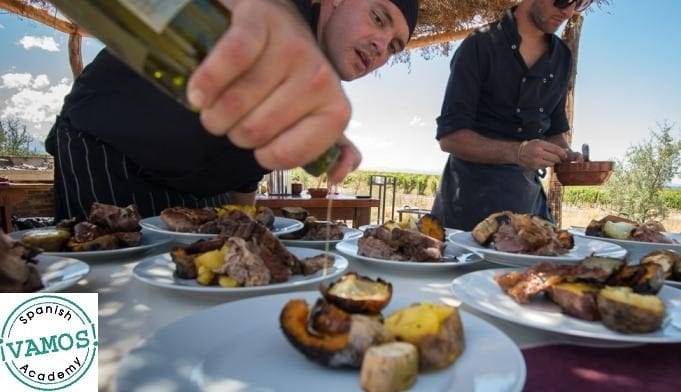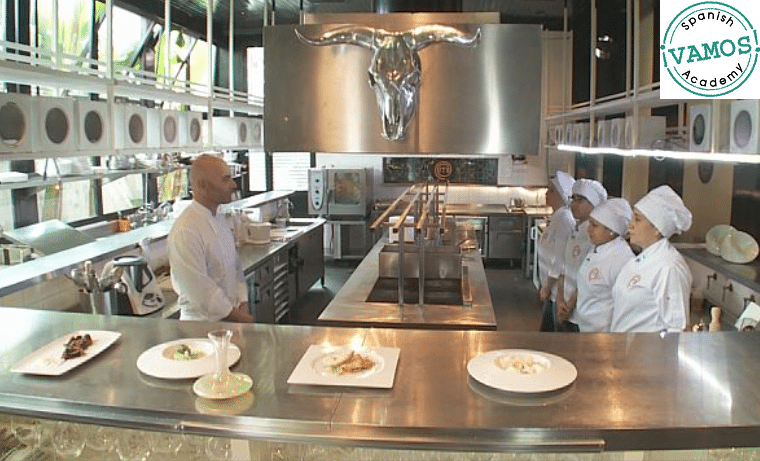Working as a Professional Chef in Buenos Aires
By Spanish School Buenos Aires – July 11 2016 (Buenos Aires, Argentina)
Ah the life of a professional chef, working and learning, getting paid to eat and learning to reproduce food that causes yours and other people’s mouths to drool. I´ve been a cook for the past 10 years working my way around some of the top places in New Zealand and recently a Michelin star restaurant in Chicago. Buenos Aires and Latin America really sparked my interest as a cook, the flavours and the strong local pride of which these flavors come from, are matched to the likes of some of the top eating and cooking destinations around the world. My partner and I decided to pack our bags and start in our adventure in one of the biggest cities in Latin America, Buenos Aires.
Why Work as a Chef in Argentina?
I started cooking as a teenager in New Zealand. The next 10 years I spent digging the trenches of my cooking career, working in a variety of establishment to have a good knowledge on how to cook food from all over the world. I stumbled into a pretty high quality establishment early in my career which helped me in developing confident and efficient skills in cooking. Over the years I met a lot of new friends traveling to New Zealand from all over the globe and a lot of my chef friends started to leave to travel the world themselves. Reading books from some of the best restaurants in the world and getting stuck in the world of fine dining, I knew that I had to get out of New Zealand to experience different perspectives/techniques in restaurants. I grew up in the United States so I knew I wanted to learn more about my roots through food in the kitchen and could find some work in my hometown of Chicago but the problem was my partner could not stay for longer than 6 months. This made long term employment impossible but forced us to travel to other places. I became very interested in the native culture of New Zealand. The way they used the earth and the rivers to cook/preserve their food, inspired me to research more into these techniques, which led me to find out that South America had a lot of somewhat similar techniques that their indigenous people used. While most of my friends wanted to go to Europe to cook for some of the best chefs in the world, I wanted a different more relatable yet less common experience than my friends. I started researching restaurants and chefs in Latin America and knew that this continent has exactly what I wanted and it was up to me to get the experience/education I desired. They seemed to have everything here: from grilled meats done differently in every country, ceviche, pastries, and local chefs that wanted to make their mark in a huge culinary scene… I was hooked and bought my ticket.
The restaurant scene in Buenos Aires
Here in Buenos Aires, there is no shortage of meat, but if you are a foreigner looking to cook in the country, good luck getting to cook it. Porteños have a very strong pride in their asados, as you will be able to tell within a few days of being here. On most streets there are a wide range of parrillas, everywhere from hole in the wall small parrillas to giant parrillas with more cuts than your stomach could handle (but you should try to handle it). But Buenos Aires is not just a giant meat fest (well I guess it is compared to other countries), it´s a huge city with lots of cultures bringing their cuisines with them. In this day and age I find it harder and harder to define what local cuisine is, for example, pizza is a huge part of local cuisine here but it came from Italy as did the huge pasta scene (it is even a tradition to eat gnocchi on the 29th of the month). You can find everything here from great Armenian cuisine to funky ramen bars. So with all these cultures mixing, the restaurant scene has a lot of techniques and ingredients from different cultures to write their menu around. A lot of the restaurants that I came across, trying to find the best restaurant to work in, were between the Belgrano and San Telmo areas of the city (Buenos Aires is huge though and hidden gems are everywhere). This area is probably the most touristy area as well, which is really no surprise as it is the area that has the most hotels and shopping. A lot of the bars and restaurants in Buenos Aires only deal in cash and because of this it makes having a restaurant as easy as opening the door to your house. Which is more or less the idea of the closed door (puertas cerradas) restaurants they have in Buenos Aires. These are usually a little more costly than publicly trading restaurants, but if a chef is opening his door to his house, it has got to be good. The pop-up restaurant scene has also made its mark in Buenos Aires with up and coming chefs taking over spaces to showcase their passion. There is a lot of options in this city it takes a bit of research and an empty stomach to find the best of the lot.
Finding work as a Chef in Buenos Aires
I can´t speak Spanish very well (if at all when I first got here). I knew the essentials from the Hispanic waiters and cooks I´ve worked with throughout the years but not much more. I got here with a CV that had some good experience at a Michelin starred restaurant and a few years as a sous chef at a place. So I thought finding a job would prove easy. Before arriving, I spent months researching places and emailing them, asking to stage (work for free) in their kitchens. Browsing Top 50 lists, Tripadvisor, Yelp, Facebook, Instagram, pretty much all your social media outlets led me to find the places that interested me. I got a few emails back but my poorly written Spanish probably directed my emails right to the trash. Once I arrived in Buenos Aires, I sent emails to the places I had already messaged telling them that I was here and ready to work, but no responses. I researched a few more places and took my CV around but still no leads. I figured it was my lack of language so I started to up my Spanish game and started to search Craigslist for a place that did not mind a gringo in the kitchen. I found a ramen shop which offered me a job with a reasonable wage that covered my expenses.
Working in Kitchens in Buenos Aires
Now my experience in the kitchen here was not the best but I enjoyed my time and the team was young and passionate. First hurdle in the kitchen was that most of the vegetables and ingredients had different names so learning all of these was a task but labeling everything was part of the job so it did not take too long to figure out. Cooking techniques have different names as well and I couldn’t label everything with how it was cooked (but I tried “choclo hervido, kimchi ahumado, etc¨). All kitchens require similar skills so the job was not particularly harder than other kitchens I had worked in, but communicating with others was difficult, lucky for me that service was fairly straight forward so a lot of communication was not required as long as you knew what was going on. Most places I’ve worked dinner service was usually around 5 until 10 or 11, but in Buenos Aires it´s much later, usually opening the doors at 8 and closing at 12/1 making being a chef even more of a night owl than normal. The longer I worked the more I realized that if I wanted to get into the better kitchens I would have to understand orders and I could not rely on hopefully knowing how to prep everything to get me by. So I decided to leave the ramen shop and put my time into learning Spanish. This is the first time I have done anything besides cooking for the last 10 years but I am looking forward to trying my luck in the restaurant scene again here once my Spanish has improved.








